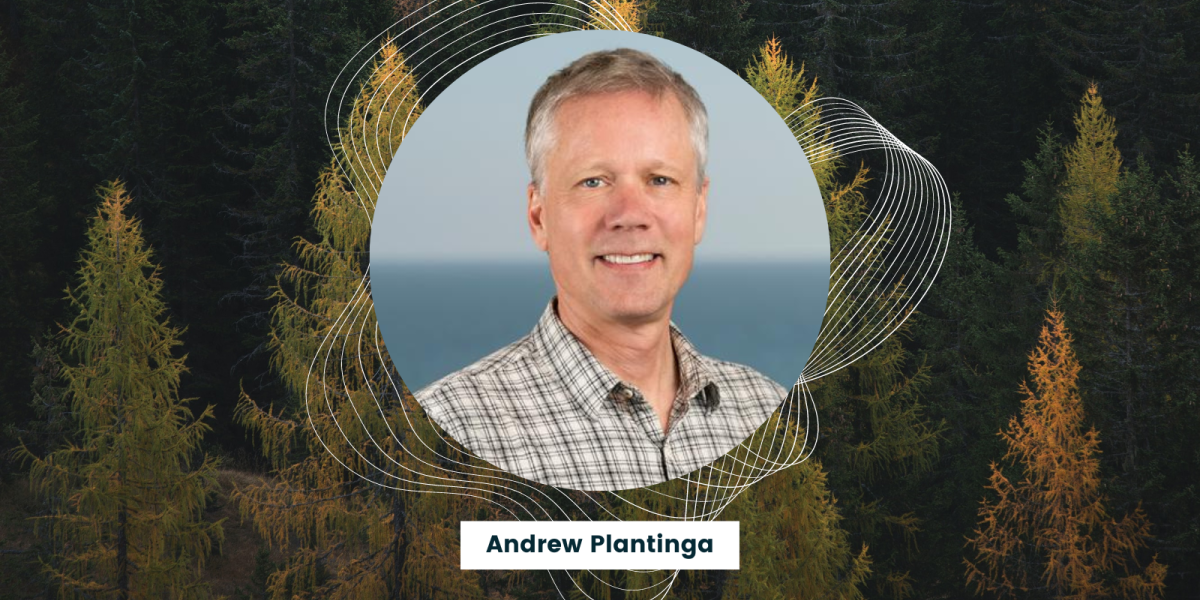
What’s your role at emLab?
I’m a Research Associate at emLab and previous Director of the Land & Freshwater program.
Where did you grow up? How do you think this area had an impact on the work you do now?
I grew up in New Haven, Connecticut. I grew up in an urban environment but I’ve always liked the outdoors. I think people who grew up the way I did and now do research in environmental science and related fields have some kind of personal interest in “nature.” I’ve always had that, especially since my family is also like that—my dad was a mountaineer in the old days when no one would go mountaineering and we were always going along on his expeditions. I think that’s how I got a passion for environmental issues and working in this area.
Were there any fields of study you were interested in before you chose land and freshwater?
I’ve worked on land my whole career even before I was a professor. Early in my career I stumbled on the subject of land use and that was a good choice because, as I started working on that, the data revolution happened. Satellite imagery of land started coming out, so it was really good timing and purely accidental, and I’ve never had incentive to shift topics. I have written some fisheries papers, and some papers on wine—although that’s land related!
Could you describe your educational career?
Mine is unusual in that I went to undergrad at Grinnell College as a math major, and I had to take a class with a professor who I thought was terrible. So I switched majors to English, and developed really good writing skills which is important no matter what you do. After I graduated, I thought “what am I going to do?” Well, I wanted to do something related to the environment so I got a degree in forestry, got interested in economics, and did agriculture and economics for my PhD.
What advice do you wish you received early in your career?
Something that I didn’t learn until later in my career is that the question you’re asking and the way you’re asking it is incredibly important. Dialing in on what your question is and deciding what analysis will lead to answers was something I was never really taught, and yet later on it became important. If someone told me early on that thoughtfully and carefully formulated research questions are necessary for results, I would have avoided useless questions.
Give me a one-word description of how you work.
Fun-seeking. I love working with other people.
What aspect of your work are you most proud of?
I think that “high impact, high visibility” work is what I’m most proud of. When I’m able to publish research in a really good journal with a lot of visibility, and other academics as well as people who work with the government and in NGOs become interested, I think that work is successful.
What keeps you curious about your work at emLab?
If you boil it all down, I really like the challenge of solving problems. I like to figure stuff out and find out how to communicate it.
What research question/topic are you most excited to tackle next?
I would like to keep working on wildfire topics. I think that’s an issue that’s emerged in the western U.S. in a way that is really different than 10 years ago. I’ve lived in the west for quite a while now, since the early 2000s, when I moved to Oregon and then came to California. When I moved here, there were wildfires and some smoke issues, but now entire states are covered in smoke and have terrible air quality. It’s a challenge impacting a lot of people.
What kind of impact do you hope your work at emLab has on the world?
The best I can hope for is that I put out information that’s thoughtful, that gets people thinking about environmental problems, and leads to better decision making somehow—either that the government makes better decisions or individuals make better choices. I’d rather live in a world where individuals like myself provide useful information about problems as opposed to misinformation.
Rapid fire questions
What is one of the most inspiring places you have been and why?
I would say a place that really stood out to me was an island in Indonesia called Flores, and it was just the most astonishing location. It had these stunning volcanoes and pools of water in these brilliant supernatural colors. That island was really rugged, remote, and hard to traverse, but its natural beauty was just astounding.
What could you present about for 40-minutes with absolutely no preparation?
I would explain everything that happens in the movie “The Big Short.” It’s really, really good, and about the housing crisis of the late aughts. The title refers to the people who figured out what was going on, and started shorting the housing market. It stars Brad Pitt and Steve Carrell, and has a lot of finance information, so what I would do is show clips from that movie and explain the economics included.
What is one song to describe this season of your life?
I play guitar, and I’ve been playing this song called Clay Pigeons, specifically John Prine’s version. The chord sequence isn’t hard, but depending on what player you’re emulating it can be a harder song to play.
What are 5 things you couldn’t live without?
My family, nature, really good food, exercise, and music.
If you could be any animal, what would it be and why?
I think I’ll pick something really ordinary, like a dog. I’m loyal.
If you could go to the past or the future as an observer, which would you choose and why?
Setting aside Terminator complications, maybe the future. But honestly, there’s nothing like the present.


